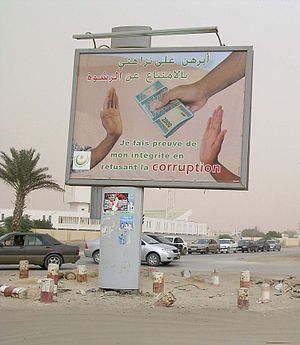Languages of Mauritania
The languages of Mauritania include the official language, Arabic, three national languages, Pular, Soninke and Wolof, and French, a former official language which is still the language of working language,[1] education and administration.[2]
The languages of Mauritania mainly consist of various Afroasiatic languages, including: Zenaga-Berber, Tamasheq-Berber, Hassaaniya Arabic and Standard written Arabic. Some ethnic minorities speak Niger-Congo languages.
Afro-Asiatic languages[edit]
- Berber
- Zenaga: Berber language that was more widely spoken in the past, but is still used in the south of the country, close to the River Senegal. The speakers of the Zenaga language are eponymously known as Zenaga Berbers. Otherwise, most of the Moor population speaks Berber languages. Islamisation and Arabisation of the population have reduced the number of Berber speakers. In 1978, the term Arabo-Berber to designate the Moors was replaced by Arab.
- Tamasheq: Tamasheq, the Berber language of the Tuareg, is spoken in the extreme south-east of the country, close to the Malian border.
- Arabic
- Modern Standard Arabic: the official language of the government of Mauritania.
- Hassaniyya Arabic: the colloquial spoken variety of Arabic. It is close to the dialect used by the Bedouins. The language serves as a lingua franca. It is also the language of the Imraguen who also use elements of Soninke.
French[edit]
According to Ethnologue, there are 705,500 speakers of French in Mauritania. It serves as a de facto national working language.[3] Mauritania is a member of the International Organisation of La Francophonie (La Francophonie).4
Sometimes French is used for certain speeches by parliamentarians in the Senate and the National Assembly, and they are broadcast on radio and television in this language. In certain areas of administration, it has undeniably established itself as the working language.[1] For example, all structures of the Ministry of Finance (Customs, Taxes, Budget, Treasury, Domains, etc.) work in this language; at the Ministry of Health, it’s the same thing. The only exception that could be cited is the Ministry of Justice where Arabic undeniably predominates; the Ministry of the Interior and that of National Education are almost equal in terms of the use of the two languages which depends mainly on the training of the user.
However, here too, there are exceptions: for example, at the Ministry of the Interior, encrypted messages and at the Ministry of National Education, Baccalaureate transcripts are exclusively in French.[1]
Niger-Congo languages[edit]
- Wolof
- Soninke
- Pulaar[4] is spoken in Mauritania by the Fula and the Toucouleur.
- Bambara
- Serer language
See also[edit]
Notes[edit]
- ^ a b c Mohamed Vall Ould Cheikh, Le français en Mauritanie : statuts et pratiques, p. 375-397
- ^ Alassane Yero Ba et Abdoul Echraf Ouedraogo, Portrait des dynamiques linguistiques et de l'alphabétisation en Mauritanie, Une analyse à partir des données du recensement de 2013.
- ^ "French". Ethnologue. Retrieved 29 January 2018.
- ^ English: Fula; French: Peul; in central and eastern West Africa the endonym is Fulfulde


 French
French Deutsch
Deutsch

